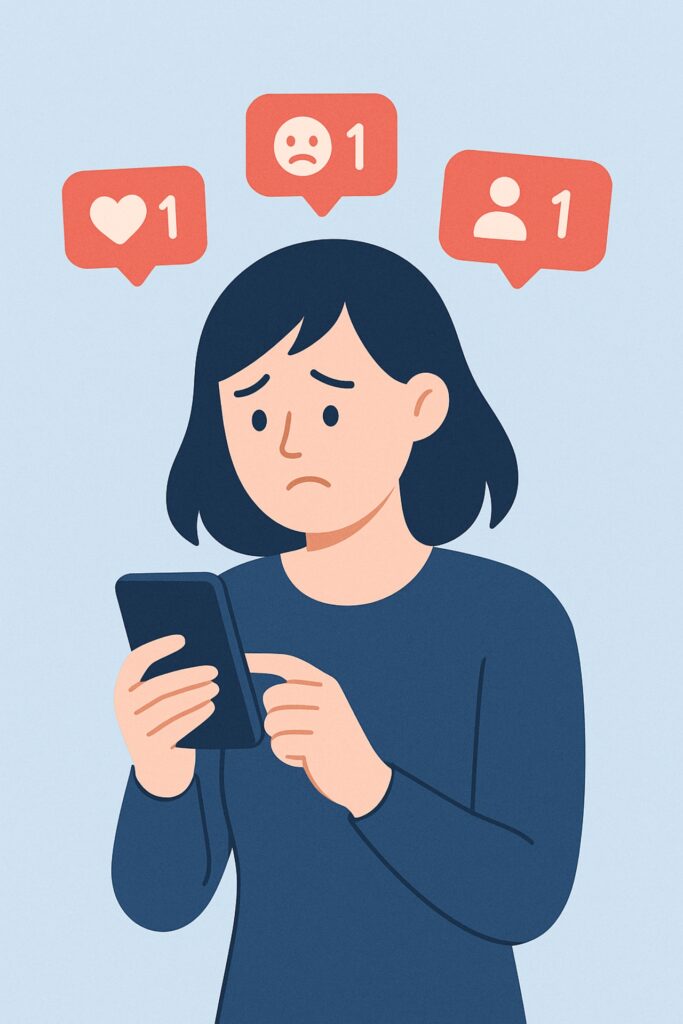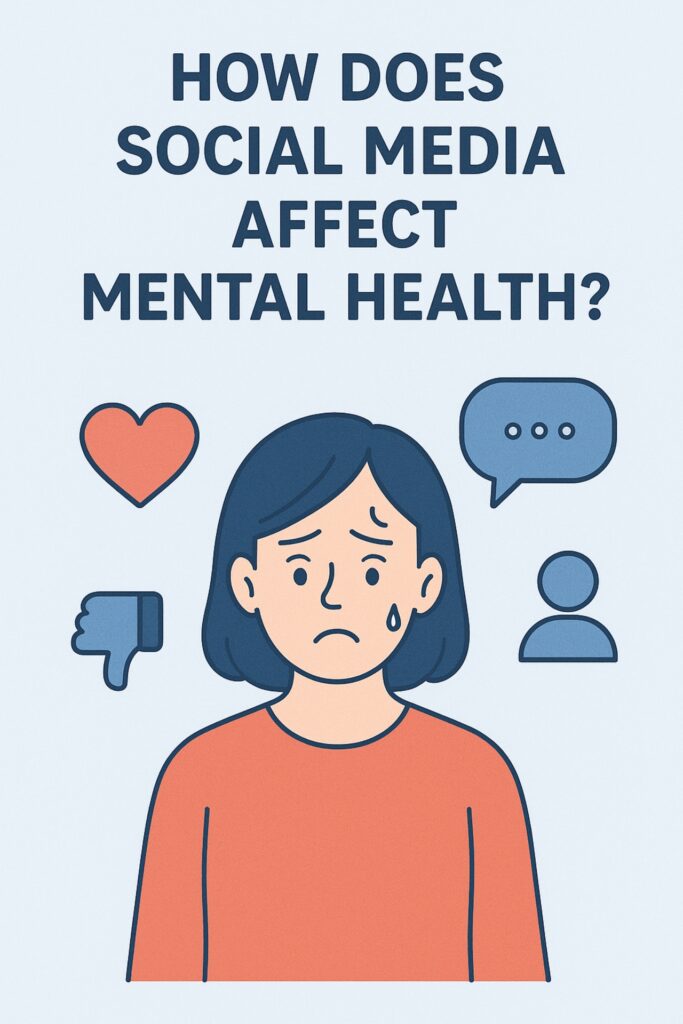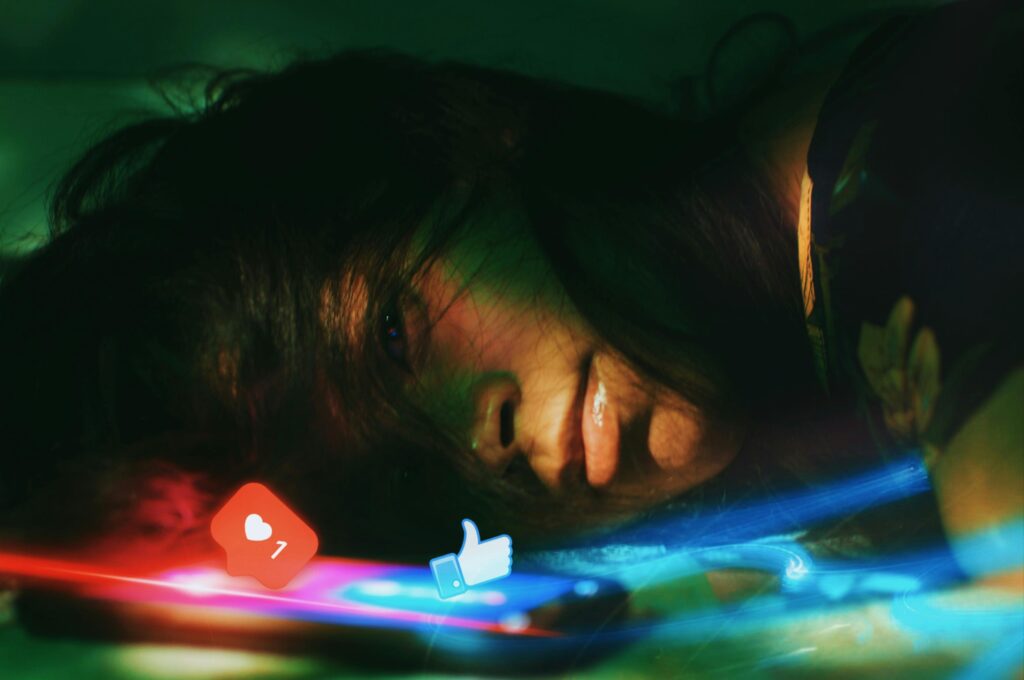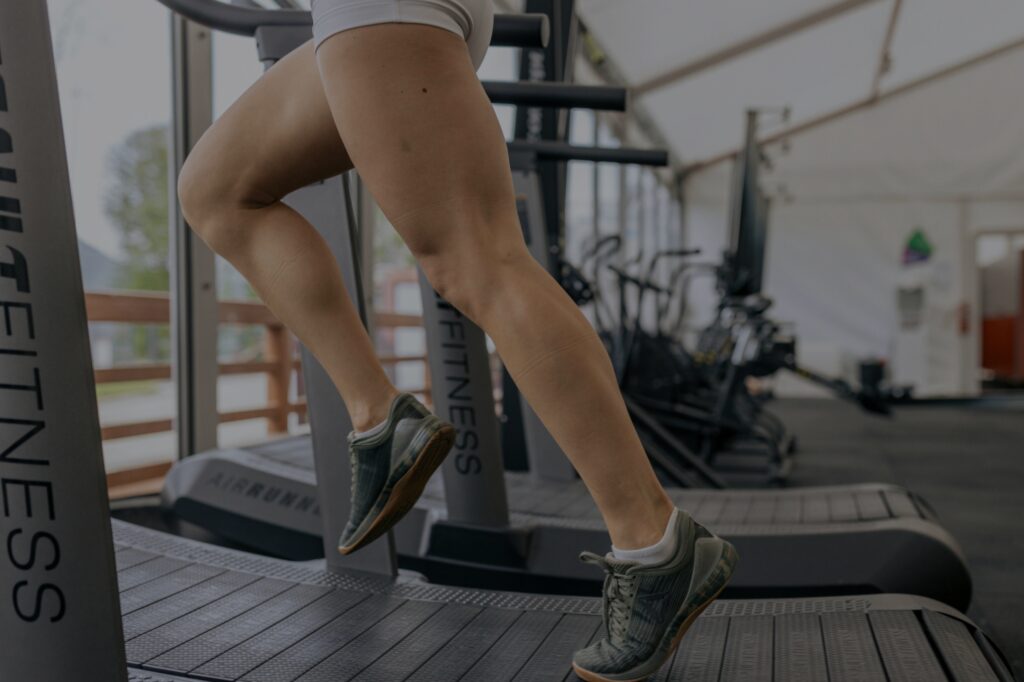Last year, a client walked into my office, her eyes glued to her phone. “I know I shouldn’t compare myself,” she said, “but everyone on Instagram is travelling, getting engaged, or landing dream jobs. Meanwhile, I’m just… stuck.” Her voice cracked. “Why does scrolling leave me feeling so empty?”

As a psychologist who cares for people’s mental health, I’ve heard versions of this story countless times. Social media isn’t inherently bad, it actually connects us to our loved ones, inspires creativity, and even saves lives during crises. But the dark side of AI algorithms that were employed in design to keep us hooked, is reshaping social media and mental health in ways we are only beginning to understand. Let’s explore why that “quick scroll” often leaves us drained and how to reclaim our balance.
Table of Contents
The Allure of Social Media: Why We Can’t Look Away
Dopamine and the Infinite Scroll
Most of the time social media taps into our brain’s reward system to manipulate our decisions. Every like, comment, or share releases a hit of dopamine, the “I feel good” chemical. That was my experience after I posted a photo of my dog, I caught myself checking my phone every 2 minutes for likes. Sound familiar?
Why Social Media Is Addictive:
- Infinite scroll: Platforms like TikTok auto-play videos, removing natural stopping points.
- Variable rewards: You never know which post will go viral, so you keep scrolling (like a slot machine).
Fear of Missing Out (FOMO): The Anxiety of Being Left Behind
FOMO is not just a buzzword; it is a primal fear. When I deactivated Instagram for a week, I felt oddly anxious, as if I would vanish from my friends’ minds, never to be remembered again. Oops, here I am today. That is the feeling that the algorithm wants you to feel.
The Hidden Costs: How Social Media Affects Mental Health

Comparison Culture: “Why Isn’t My Life That Perfect?”
Social media is like a highlight reel. A teenager I worked with once tearfully asked, “How is everyone prettier, funnier, and happier than me?” We later scrolled through her feed together she hadn’t noticed that even influencers use filters, angle camera setting, and staged moments.
Key Stats:
- 60% of teens say social media makes them feel “not good enough” (APA Study).
Cyberbullying and Online Harassment
One of the empowerments that you gain with web browsers is anonymity that emboldens cruelty. A college student I counselled received hateful DMs after posting about body positivity. She deleted her account, saying, “I’d rather be lonely than attacked.”
Sleep Disruption: The Blue Light Blues
Scrolling before bed isn’t just a bad habit it is a sleep killer. This has been proven, and many can testify to it. The blue light from screens suppresses melatonin, the sleep hormone, which is why you must be very mindful of social media and mental health, mindful. I struggled with insomnia until I banned phones from my bedroom. Since that time I have been experiencing deeper sleep in 3 days now.
Real-Life Stories: When Likes Turn to Loneliness
- Sarah, 28: “I had 1,000 followers but no real friends. I quit social media and joined a book club. Now I have 3 friends who actually know me.”
- James, 16: “I posted gym selfies daily for validation. When I stopped, my confidence tanked. Therapy helped me rebuild it offline.”
Reclaiming Control: Strategies for Healthier Social Media Use

Digital Detox Tips That Actually Work
- Try a “No-Scroll Sunday”: This is one of my monthly routines. The first time was agonising; by noon I would have picked up a forgotten hobby (painting!).
- Delete apps temporarily: Use Screen Time (iOS) or Digital Wellbeing (Android) to block apps after 9 PM. This will help you a lot and it will cultivate a positive habit in you.
Curate a Positive Feed
Unfollow accounts that make you feel inadequate, some people are bitter about life and they are ready to spread that to you. Follow hashtags like #BodyPositivity or #MentalHealthMatters. Look for feeds that has motivational quotes and healthy talks that can help your mental health.
Mindful Posting: Ask “Why Am I Sharing This?”
Before posting, pause and reflect deeply before taking that action if you are truly seeking connection or validation. A client started journaling instead of posting rants. “I feel lighter,” she said. If you are not satisfied with yourself, nobody will bring that to you.
Conclusion
Social media is a tool and not a life sentence. By setting boundaries, curating our feeds, and reconnecting offline more often, we can enjoy the best of the digital world without sacrificing our mental health. Next time you reach for your phone, ask: Is this serving me, or stressing me? Share this article to help others scroll more mindfully.
FAQs
Can social media cause depression?
Studies link heavy use to higher depression risk, especially in teens. Constant comparison and cyberbullying are key factors.
How does social media affect teenagers’ mental health?
Teens are more vulnerable to FOMO, body image issues, and sleep disruption. Parental guidance and screen limits are crucial.
What are the signs of social media addiction?
Constant scrolling, dopamine-driven engagement, and FOMO-related anxiety are key signs of addiction.
How can I reduce social media anxiety?
Limit screen time, curate a positive feed, and take digital detoxes to regain control over your mental well beign.
Is quitting social media good for mental health?
Many people report improved mood, better sleep and stronger real life connections after reducing social media use.


